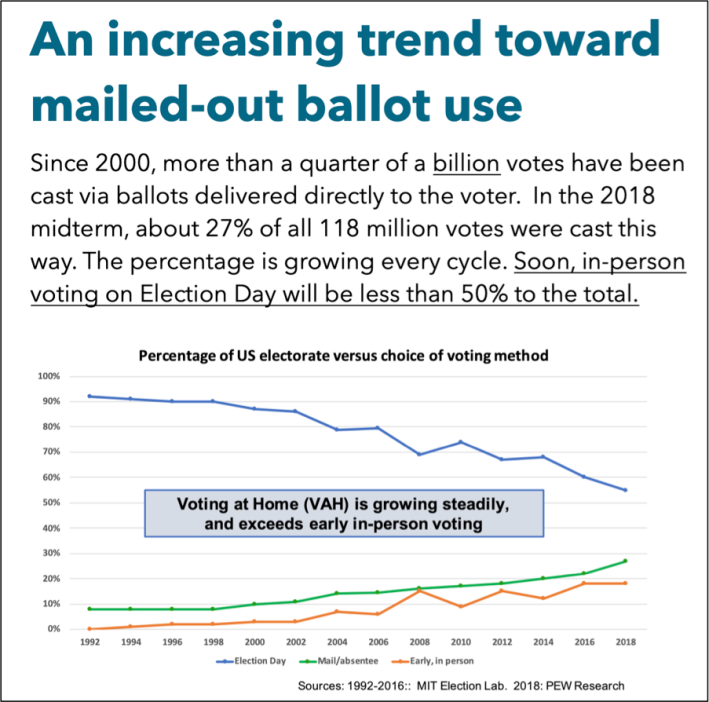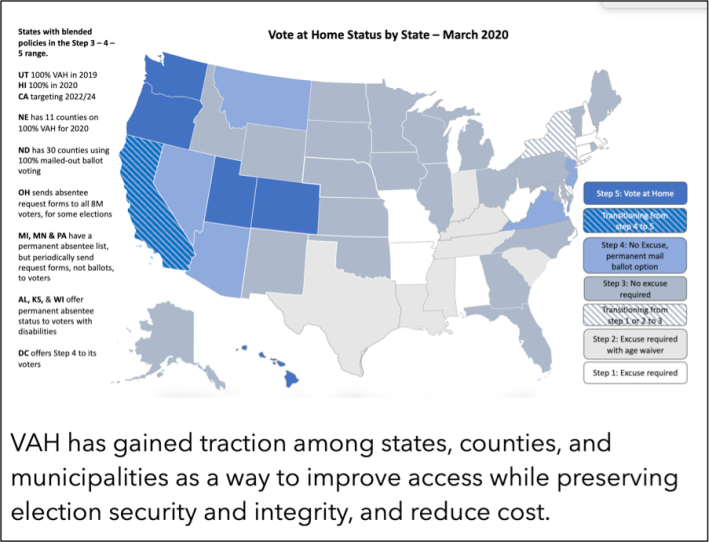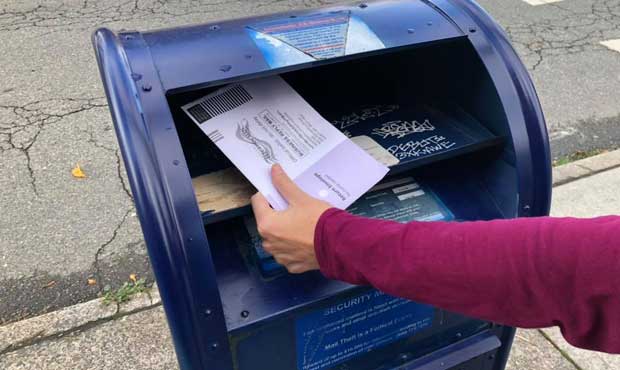With Ohio postponing its Tuesday primary hours before polls opened, voting rights advocates are again urging lawmakers to radically expand mail-in voting now to make sure elections remain free and open during and after the ongoing COVID-19 outbreak — and if they win, it'll be great news for safe transportation, too.
In an average year, inadequate transportation is the third most-cited reason that voters don't make to the ballot box, a problem that's particularly acute among seniors, disabled persons, low-income workers with multiple jobs, people with erratic schedules, and voters in auto-dependent areas who don't have access to a car. Coronavirus concerns are predicted to keep an even more devastating volume of voters away from the polls this year, especially as the CDC actively encourages social distancing to slow the spread of the virus.
That's why Ohio scrubbed its primary, a crucial Rust Belt battle between Bernie Sanders and Joe Biden.
The good news is that groups like the National Vote at Home Institute say we can confront both of these threats to democracy with one common-sense policy: radically expanding the number of Americans who can vote by mail or online.
"We’re really not advocating for anything new," said Audrey Kline, the group's policy director. "It’s just that a lot of Americans all woke up to our issue on the same day."

Unfortunately, state leaders have been slower to rouse. Arizona, Illinois and Florida all opted to open ballot boxes for the Democratic primaries today, despite public pressure to postpone and take emergency steps to expand remote voting.
If early reports are to be believed, that decision wasn't wise. Waves of election volunteers in Florida are simply not showing up to their assigned posts, prompting the unannounced closure of polling centers; Illinois projected low voter turnout with something of a shrug, and then promptly ran out of hand sanitizer at many locations; Arizona preemptively cut polling locations by more than a third in its most populous county, and instead of fighting for her citizens' right to vote, the Arizona Secretary of State told residents to just "make the decision that's right for you."
Obviously, every state allows for mail-in absentee balloting in some form. But even in a relatively permissive state like Ohio, a voter has to first request an application for an absentee ballot and provide a reasonable explanation for why he or she can't make it to the polls. And that process must be repeated for every election — an onerous requirement that advocates argue suppresses remote voter participation.
Voting rights advocates are pressing states to not only allow voters to apply for permanent absentee status without an approved excuse, but to follow the lead of five states that have made mail-in ballots their default — and keep those policies intact even after COVID-19 is eradicated. Voters in Colorado, Hawaii, Oregon, Utah and Washington all get a ballot in the mail automatically for every election, and have the option of casting it in person on Election Day or simply filling it out and mailing it back. The National Vote at Home Institute says that, ideally, all states would pay for voters' postage, too.

Even without an ongoing pandemic, vote from home policies are popular when they're made easily available. Colorado, Oregon and Washington all rank in the top 10 states for voter turnout; Hawaii and Utah's vote-by-mail programs are much newer, but early research suggests they're on track to boost election participation, especially among historically underrepresented groups.
And some states even save money by de-emphasizing the in-person voting process: Colorado saved $6 per voter in the 2016 presidential election, or over $16 million.
The largest barriers to implementing vote-by-mail programs seem to be voter perceptions that they aren't secure, and largely conservative anti-voter fraud groups that are pushing to restrict access to the ballot box. But anti-voter suppression activists have long argued that mail-in voting is every bit as safe and confidential as voting in person — and potentially even safer, since paper ballots cannot be electronically hacked like electronic voting machines or online voting programs, and they leave a paper trail to boot.
"It's 99.9-percent secure," said Kline. "If you reach into someone's mailbox, fill out her ballot, sign it, and send it in, you're going to get caught, and you're going to be tried for mail fraud and voter fraud."
It may be challenging for states to implement emergency vote-from-home policies quickly in response to COVID-19, but Kline doesn't think it's impossible.
"I would say it's probably not realistic in, say, a week, but amazing things are possible when large governments come together and make a decision," she said. "And regardless of whether laws change, we think voter behaviors are going to change. More people were voting from home than ever, and that was before all this happened."
If the coronavirus crisis continues, she may well be right — and if our states pass vote from home policies now, it could keep a lot of people from driving to polls, without taking away their votes in the process.






